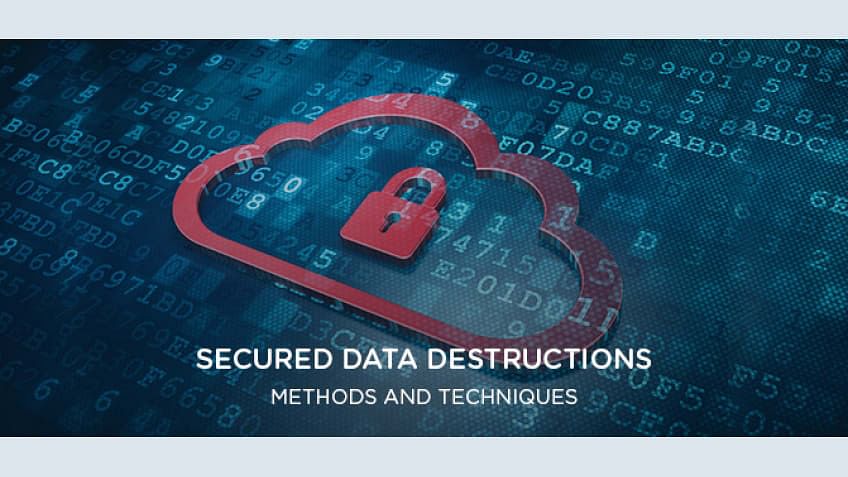The Essential Nature of Data Devastation in Upholding Computer System Safety And Security Solutions and Protecting Versus Unauthorized Gain Access To
In a period where information violations and identity burglary are significantly prevalent, the significance of reliable data destruction can not be overstated. Organizations has to identify that the failure to appropriately get rid of sensitive details presents not only legal and economic risks however additionally a possible disintegration of client count on. Different methods, from information cleaning to physical destruction, work as essential safeguards versus unauthorized access. Understanding the effects of information devastation methods and conformity with regulations elevates crucial concerns regarding the competence of present methods and their long-lasting viability in the face of developing risks.
Importance of Data Devastation
In a progressively electronic world, the importance of information destruction can not be overemphasized. As organizations amass vast amounts of delicate information, the possible repercussions of falling short to correctly handle and dispose of that information become increasingly serious. Data violations, identity burglary, and business reconnaissance position significant hazards, underscoring the necessity of reliable data destruction methods.

In addition, as modern technology advances, so also do the techniques whereby malicious stars seek to exploit delicate information. Organizations should remain aggressive and vigilant in their information destruction strategies to safeguard versus these evolving threats. By focusing on information damage, business not only safeguard their possessions however additionally foster trust amongst customers and stakeholders, demonstrating a dedication to liable data administration and safety techniques.
Techniques of Effective Data Destruction
To make certain the total and irreparable devastation of delicate data, organizations can use a variety of efficient methods customized to their particular requirements. One of the most typical methods is data cleaning, which involves using specialized software application to overwrite existing data numerous times, making recovery virtually impossible. This is especially helpful for solid-state drives and tough drives, where standard removal approaches are inadequate.
Another effective approach is degaussing, which utilizes strong electromagnetic fields to interfere with the magnetic domains on storage media, providing the data irretrievable. This technique is particularly suited for magnetic storage gadgets, such as tape drives and hard drives.
Physical destruction is additionally a sensible option, entailing the shredding, crushing, or incineration of storage gadgets. This approach guarantees that data can not be recouped, making it optimal for organizations taking care of extremely delicate information.

Conformity With Information Protection Rules
Organizations should not only concentrate on reliable information damage techniques yet likewise make sure compliance with data protection guidelines that control exactly how delicate info is handled and thrown away. Complying with these laws is necessary for preserving and guarding individual data client depend on. Regulations such as the General Information Protection Regulation (GDPR) in the European Union and the Medical Insurance Portability and Responsibility Act (HIPAA) in the United States enforce stringent guidelines on data monitoring, which include demands for the protected disposal of sensitive details.
To attain compliance, companies need to execute thorough information devastation policies that align with these legal structures. This includes identifying information that needs devastation, developing methods for protected methodsâEUR" such as shredding physical media or making use of software that meets market criteria for information wipingâEUR" and maintaining in-depth documents of destruction tasks. Regular audits ought to be carried out to guarantee adherence to these plans and to determine any kind of potential areas for renovation.
Failing to adhere to data defense regulations can bring about significant lawful implications, consisting of significant penalties and damage to an organization's track record. Integrating compliance into information devastation practices is not just a lawful commitment but likewise an important part of a robust information security method.
Effects of Poor Information Handling
Poor data handling can result in extreme repercussions that prolong past immediate functional troubles. Organizations might encounter significant financial losses as a result of information why not find out more breaches, which commonly result in expensive remediation initiatives, lawful charges, and regulative penalties. These economic effects can prevent and strain sources development, ultimately influencing a company's profits.
Furthermore, inadequate data handling can seriously harm a company's track record. Partners, stakeholders, and customers may lose count on in an entity that stops working to shield sensitive info, leading to reduced client commitment and prospective loss of organization opportunities. This disintegration of trust can take years to rebuild, if it can be restored in all.
Furthermore, organizations could face legal ramifications developing from non-compliance with data defense guidelines. Such infractions may lead to penalties and investigations, worsening the financial burden and more tainting the organization's image.
In the world of cybersecurity, insufficient information management methods can create susceptabilities that make systems a lot more at risk to unapproved accessibility and cyberattacks. Ultimately, these effects emphasize the vital importance of applying robust data dealing with treatments to guard delicate details and preserve organizational stability.
Finest Practices for Secure Information Disposal


Firstly, information need to be categorized according to its sensitivity. Delicate information requires a lot more strenuous disposal approaches, such as shredding physical documents and utilizing sophisticated software program for electronic information cleaning. Using licensed data devastation solutions guarantees conformity with sector regulations and standards.
Second of all, organizations ought to apply a data disposal plan that mandates routine audits. This policy ought to detail the procedures for information retention and destruction, ensuring that out-of-date data is dealt with without delay and safely. Training workers on these protocols is vital to fostering a society of security understanding.
Lastly, preserving thorough records of disposed information enhances accountability and provides a clear audit trail. This documents needs to consist of the kind of data damaged, the approach utilized, and the day of disposal.
Final Thought
Finally, the imperative of reliable information devastation is apparent in its role in enhancing computer protection services and minimizing unauthorized access threats. Embracing durable methods such as information cleaning, degaussing, and physical devastation, together with compliance with regulations like GDPR and HIPAA, is necessary for protecting delicate details. Neglecting proper information disposal practices can bring about serious repercussions, including information breaches and lawful consequences. Implementing finest techniques in safe and secure data disposal inevitably fortifies business stability and customer count on.
In a period where information violations and identity theft are increasingly widespread, the relevance of effective data devastation can not be overstated. data destruction. Information breaches, identification theft, and corporate espionage position substantial dangers, highlighting the requirement of reliable data damage techniques
Conformity with laws such as GDPR and HIPAA requireds that organizations implement stringent information protection actions, including the secure devastation of information at the end of its lifecycle.
By focusing on data destruction, companies not just protect their assets but likewise foster depend on amongst stakeholders useful content and clients, demonstrating a commitment to liable information administration and protection practices.
Organizations need to not just concentrate on efficient information damage methods yet also make sure conformity with data defense guidelines that regulate just how delicate information is taken care of and disposed of.